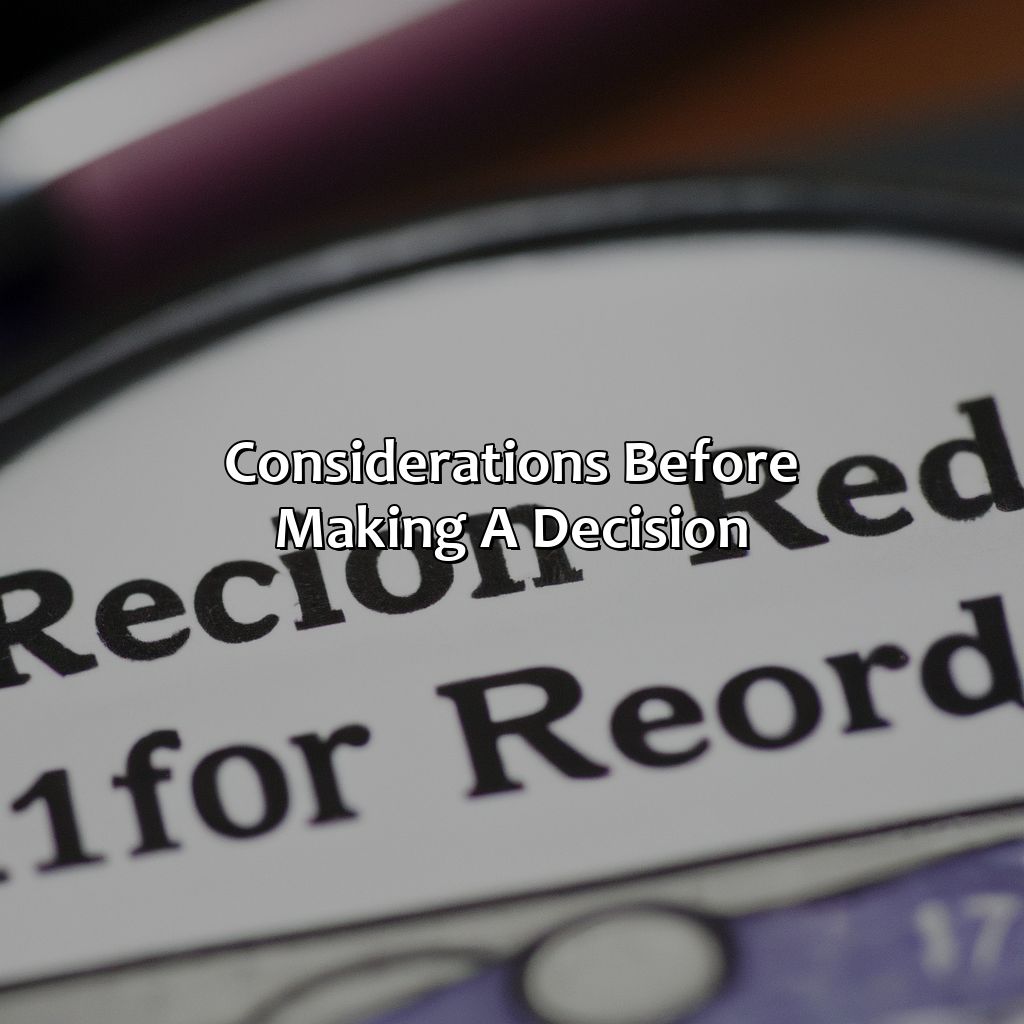What To Do With Retirement Funds When Changing Jobs?
Key Takeaways:
- Changing jobs can result in changes to retirement funds. Options include rolling over into a new employer’s retirement plan, transferring to an individual retirement account, or leaving the funds in the old employer’s plan.
- Before making a decision, consider the fees and expenses, investment options and performance, and employer matching contributions. Each option has its own benefits and drawbacks, so it’s important to weigh these factors before making a final decision.
- Ultimately, the decision about what to do with retirement funds when changing jobs depends on individual circumstances and goals. Seeking advice from a financial professional can help make the best decision for the future.
Are you facing the choice of what to do with the retirement funds from your old job? You’re not alone: considering your choices for retirement funds when changing jobs is a common question. In this article, we’ll look at the best options available to you.
Options for retirement funds
When you change jobs, you have three ways to manage your retirement funds:
- Roll over into a new employer’s retirement plan.
- Transfer to an Individual Retirement Account (IRA).
- Or leave the money in the old employer’s plan.
Each has its own pros and cons.

Image credits: retiregenz.com by David Arnold
Roll over into new employer’s retirement plan
One option for managing retirement funds when changing jobs is to transfer the funds into your new employer’s retirement plan. This allows you to combine your previous savings with your new contributions and potentially receive matching contributions from your new employer. Be sure to check if your new plan accepts rollovers and any associated fees or restrictions.
Additionally, rolling over into a new employer’s retirement plan can simplify managing your funds since all of your savings will be in one place rather than spread across multiple accounts. It may also offer access to different investment options and lower administrative costs compared to maintaining separate accounts.
If you decide to roll over your retirement funds, be sure to choose investments that align with your goals and risk tolerance. Consider speaking with a financial advisor to determine the best strategy for managing your retirement savings.
Pro Tip: Before transferring funds from an old retirement account, be sure to familiarize yourself with any penalties or tax implications that could result from early withdrawals.
Your old retirement fund’s new home: An IRA, where it’ll be treated better than your ex ever did.
Transfer to an individual retirement account (IRA)
One of the options available for transferring retirement funds from a previous employer is placing them into an individual retirement account (IRA). This allows the funds to continue growing tax-deferred until they are withdrawn in retirement. By doing this, individuals may also have more control over their investment choices.
Transferring to an IRA can give the owner flexibility, especially if they want to avoid holding their assets within company-sponsored plans. No taxes will be incurred with such a move, as long as the transfer process follows all applicable rules and regulations.
In addition to providing control over investment options and consolidating account holdings, an IRA can provide other benefits such as lower fees and interest rates. It’s crucial to understand that there could be penalties if funds intended for rollover are paid out before rolling them over in a timely manner.
A few years ago, I worked for a company that was in financial trouble. At that time, my colleague faced difficulty when it came to transferring her retirement funds after being laid off. While she initially held her 401(k) with our prior employer, she later discovered its fees were higher than desired. She considered transferring her investments into an IRA but found it challenging due to protocol complications while transitioning between jobs.
Leaving your retirement funds in your old employer’s plan is like leaving your ex’s toothbrush in your bathroom – it’s just taking up space and reminding you of past mistakes.
Leave the funds in the old employer’s plan
One option available when transitioning between jobs is to keep retirement funds in the former employer’s plan. This may be beneficial if the plan offers low fees, a wide variety of investment options, and high-quality services. Additionally, leaving funds untouched can eliminate taxes and early withdrawal penalties. However, it’s important to stay informed on account maintenance requirements to avoid losing track of or getting charged for dormant accounts.
Pro Tip: Before making any decisions regarding retirement funds, consider consulting with a financial advisor or tax professional for personalized guidance.
Before making any decisions, ask yourself: “Will I regret this when I’m old and wrinkly, or will I just blame it on my failing memory?“
Considerations before making a decision
Changing jobs? To make a wise decision about your retirement funds, think of a few things. To choose wisely, take a look at fees and expenses, investment options and performance, and employer matching contributions. These give insight into your retirement accounts and help you decide the best route.

Image credits: retiregenz.com by Joel Washington
Fees and expenses
The Expenses and Charges Associated with Changing Jobs and Retirement Funds
Expenses and charges are inevitable when making decisions concerning retirement funds when changing jobs. Below are four crucial points to consider:
- Early Withdrawal Penalties – Most retirement plans charge early withdrawal penalties before 59 ½ years of age.
- Transaction Fees – Certain custodians may incur transaction fees, which are typically charged for transferring the funds from one account to another.
- Administrative Fees – It is essential to check if your new employer’s retirement plan has administrative fees or if the old plan carries over those fees.
- Taxes – Unlike Roth accounts, Traditional IRAs or 401(k) accounts carry income tax liabilities at withdrawal.
It is also essential to understand that some financial institutions use complicated product structures and can add more costs, making it more difficult to decipher exactly how much you will be paying.
Whether it is choosing a new retirement plan or deciding what to do with an old plan, always analyze any presented options independently.
A colleague once told me he lost almost half his balance in transition because of underlying fund management charges and surrender charges. He didn’t know what the underlying charges were beforehand, so he simply signed on to the dotted lines without reading through the contract documents.
Choosing the right investment option is like trying to choose a flavor of ice cream in a supermarket – overwhelming, yet still satisfying in the end.
Investment options and performance
One aspect to consider before transferring retirement funds when changing jobs is the available Investment options and performance. To help potential investors make a well-informed decision, we have created a table detailing various investment options that are being offered by different companies. The table includes columns such as Expense Ratio, Fund Performance, Minimum Investment Amount, Management Fee and more. These metrics provide valuable insights and help individuals make informed decisions based on their personal preferences.
For example, one unique factor would be assessing whether an active or passive management strategy is suitable for your investing style. An active strategy provides finer control over the invested funds while the passive approach generally involves tracking market indexes without too much interference or input from the investor.
Moreover, according to a recent study published in Forbes Magazine, choosing low-cost index funds outweighs intricate stock selection methods in acquiring returns with less risk over a more extended period.
Your employer’s matching contributions may make you feel loved, but remember, they’ll leave you just as quickly as your ex-employer when you switch jobs.
Employer matching contributions
One of the essential considerations while deciding what to do with your retirement funds when changing jobs is the Employer contribution matching. It is crucial to understand how much your employer contributes towards your retirement funds and the policies that govern your 401(k) account.
- Employer-contribution matches are often subject to vesting schedules whereby a portion of the match may not be available until you have worked for a specific period.
- It’s important to determine the vesting schedule before deciding to cash out or rollover the funds.
- Your employer may have different rules governing in-service distributions, i.e., withdrawals made before you retire.
It’s significant to note that even if you decide to roll over your funds, it’s unlikely that you will be able to transfer any unvested employer contributions. Hence it’s essential always to read and understand all relevant materials provided by your former employer regarding contributions.
You may encounter plans where employers offer an additional fixed amount for every dollar that you contribute up to a specific limit. These details highlight how investments offered by employers can vary greatly from one another, making it necessary in choosing a suitable plan.
A friend once had trouble withdrawing his fund contributions due to company fraud. They had invested illegally; hence they lost their jobs and could not withdraw their savings immediately since investigations were ongoing. Ensure you choose reputable investment opportunities regardless of matching contributions before sharing your nest egg with them.
Some Facts About What To Do With Retirement Funds When Changing Jobs:
- ✅ You can leave your retirement funds in your former employer’s plan, if allowed. (Source: Investopedia)
- ✅ You can roll over your retirement funds into your new employer’s plan, if available. (Source: The Balance)
- ✅ You can roll over your retirement funds into an IRA. (Source: Fidelity)
- ✅ You may face taxes and penalties if you withdraw your retirement funds before age 59 1/2. (Source: CNBC)
- ✅ It is important to consider fees and investment options when deciding what to do with your retirement funds. (Source: U.S. Department of Labor)
FAQs about What To Do With Retirement Funds When Changing Jobs?
What should I do with my retirement funds when changing jobs?
When you leave a job, you can choose to leave your retirement funds in your current employer’s plan, roll them over to a new employer’s plan, roll them into an IRA, or cash them out. Each option has its pros and cons, so it’s important to consider your specific situation and goals before making a decision.
Can I leave my retirement funds in my old employer’s plan?
Yes, you may be able to leave your retirement funds in your old employer’s plan if the plan allows it. This can be a good option if you’re happy with the plan’s investment options and fees, but keep in mind that you may not be able to make additional contributions to the plan if you’re no longer employed by the company.
Is it a good idea to roll over my retirement funds to a new employer’s plan?
If your new employer offers a retirement plan with good investment options and low fees, rolling over your retirement funds can be a good option. This can make it easier to keep track of your retirement savings and potentially save on fees. However, if your new employer’s plan has limited investment options or high fees, you may be better off rolling your funds into an IRA.
What are the advantages of rolling over my retirement funds into an IRA?
Rolling over your retirement funds into an IRA can give you more control over your investments and potentially lower fees. You can choose the investments that best fit your goals and risk tolerance, and you’ll have more flexibility when it comes to making withdrawals in retirement. Additionally, IRAs typically offer a wider range of investment options than employer-sponsored plans.
What are the tax implications of cashing out my retirement funds?
If you cash out your retirement funds when changing jobs, you’ll owe income tax on the withdrawal amount as well as a 10% early withdrawal penalty if you’re under age 59½. Additionally, you’ll miss out on the potential growth of those funds over time. Cashing out should generally be avoided unless you absolutely need the money for an emergency.
How can I make the best decision about what to do with my retirement funds?
It’s important to consider your specific financial situation, goals, and the pros and cons of each option before deciding what to do with your retirement funds. You may want to consult with a financial advisor or tax professional for guidance. Additionally, you should carefully review the fees and investment options of any potential new employer’s plan or IRA before making a decision.








